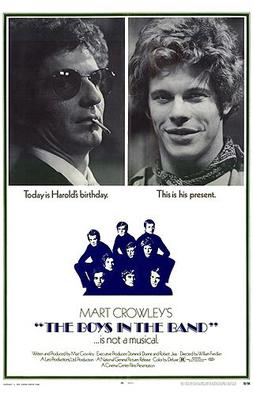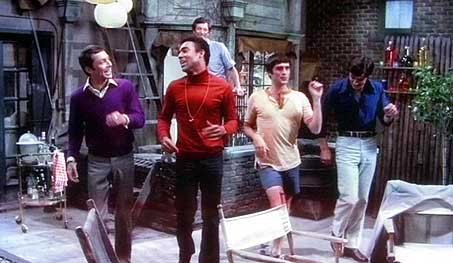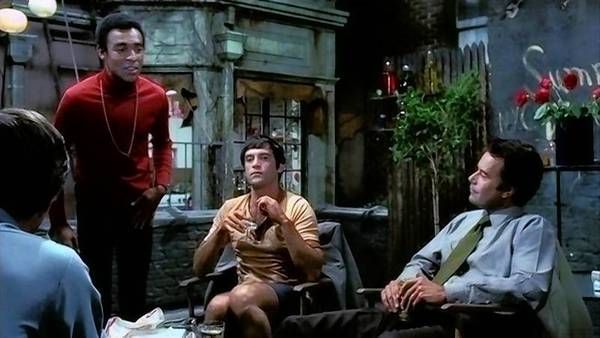← Back to Reviews
in

The Boys in the Band was the ground breaking 1970 film, based on Mart Crowley's play that was probably the first mainstream theatrical film in which most of the characters are homosexual. Despite some extremely dated elements, this film was important in that it did not present all gay characters as flouncing fairies, though that stereotype is definitely represented here. What this film does do is present homosexuals in all shapes, sizes, colors, and degrees of masculinity.

The film takes place during a birthday party thrown by Michael (Kenneth Nelson) for his friend Harold (Leonard Frey) with a short guest list which includes Michael's best friend Donald (Frederick Combs), a former trick with whom Michael eventually became BFF's. Hank (Laurence Luckinbill) and Larry (Keith Prentice) are in a committed relationship, though Hank seems a little more committed than Larry. Cliff Gorman is hysterically funny as the flouncing fairy Emory and Rueben Greene plays his gal pal Bernard, the only non-caucasian party guest.

Things get sticky when an old friend of Michael's from college named Alan (Peter White) shows up unexpectedly, who may or may not be gay and may or may not know about Michael and may or may not be attracted to Hank. Michael also initiates a vicious party game that turns really ugly and brings some long bubbling resentments to the surface.

William Friedkin's masterful and in-your-face direction is a big plus here and the performances are uniformaly first-rate down the line. Sadly, several of the actors in this film, who were gay in real life, are no longer with us, a sort of underlying message that the film still seems to send today. I also liked the fact that this film, like 1982's Making Love, addressed the fact that being married has nothing to do with sexual orientation. We learn that Hank was married and left his wife to be with Larry and Alan's confusion about it is kind of aggravating.
If you have an open mind and looking for something a little different that has a significant spot in cinematic history, check this one out.

The Boys in the Band was the ground breaking 1970 film, based on Mart Crowley's play that was probably the first mainstream theatrical film in which most of the characters are homosexual. Despite some extremely dated elements, this film was important in that it did not present all gay characters as flouncing fairies, though that stereotype is definitely represented here. What this film does do is present homosexuals in all shapes, sizes, colors, and degrees of masculinity.

The film takes place during a birthday party thrown by Michael (Kenneth Nelson) for his friend Harold (Leonard Frey) with a short guest list which includes Michael's best friend Donald (Frederick Combs), a former trick with whom Michael eventually became BFF's. Hank (Laurence Luckinbill) and Larry (Keith Prentice) are in a committed relationship, though Hank seems a little more committed than Larry. Cliff Gorman is hysterically funny as the flouncing fairy Emory and Rueben Greene plays his gal pal Bernard, the only non-caucasian party guest.
Things get sticky when an old friend of Michael's from college named Alan (Peter White) shows up unexpectedly, who may or may not be gay and may or may not know about Michael and may or may not be attracted to Hank. Michael also initiates a vicious party game that turns really ugly and brings some long bubbling resentments to the surface.

William Friedkin's masterful and in-your-face direction is a big plus here and the performances are uniformaly first-rate down the line. Sadly, several of the actors in this film, who were gay in real life, are no longer with us, a sort of underlying message that the film still seems to send today. I also liked the fact that this film, like 1982's Making Love, addressed the fact that being married has nothing to do with sexual orientation. We learn that Hank was married and left his wife to be with Larry and Alan's confusion about it is kind of aggravating.
If you have an open mind and looking for something a little different that has a significant spot in cinematic history, check this one out.
